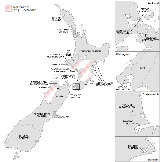
New Zealand general election, 1853
Encyclopedia
The 1853 New Zealand general election was a nationwide vote to determine the shape of the New Zealand Parliament's 1st term
. It was the first national election ever held in New Zealand
, although Parliament did not yet have full authority to govern the colony, which was part of the British Empire
at that time.
, passed by the Parliament of the United Kingdom
, established a bicameral
New Zealand Parliament, with the lower house
(the House of Representatives) being elected by popular vote. Votes were to be cast under a simple FPP system, and the secret ballot
had not yet been introduced. To qualify as a voter, one needed to be male, to be a British subject, to be at least 21 years old, to own a certain value of land, and to not be serving a criminal sentence.
At the time of the 1853 elections, there were no political parties in New Zealand. As such, all candidates were independents.
on 14 July, and the final election day was on 1 October. Hugh Carleton
(Bay of Islands) was the first MP ever elected in New Zealand (though he was elected unopposed), so he liked to be called the Father of the House
.
There were 5,849 people registered to vote. The number of electoral districts was 24, and some districts elected multiple MPs. The total number of seats was 37. Some parts of the colony were not part of any district, and did not have representation in Parliament.
1st New Zealand Parliament
The 1st New Zealand Parliament was a term of the Parliament of New Zealand. It opened on 24 May 1854, following New Zealand's first general election . It was dissolved on 15 September 1855 in preparation for that year's election...
. It was the first national election ever held in New Zealand
New Zealand
New Zealand is an island country in the south-western Pacific Ocean comprising two main landmasses and numerous smaller islands. The country is situated some east of Australia across the Tasman Sea, and roughly south of the Pacific island nations of New Caledonia, Fiji, and Tonga...
, although Parliament did not yet have full authority to govern the colony, which was part of the British Empire
British Empire
The British Empire comprised the dominions, colonies, protectorates, mandates and other territories ruled or administered by the United Kingdom. It originated with the overseas colonies and trading posts established by England in the late 16th and early 17th centuries. At its height, it was the...
at that time.
Background
The New Zealand Constitution Act 1852New Zealand Constitution Act 1852
The New Zealand Constitution Act 1852 was an Act of the Parliament of the United Kingdom that granted self-government to the colony of New Zealand...
, passed by the Parliament of the United Kingdom
Parliament of the United Kingdom
The Parliament of the United Kingdom of Great Britain and Northern Ireland is the supreme legislative body in the United Kingdom, British Crown dependencies and British overseas territories, located in London...
, established a bicameral
Bicameralism
In the government, bicameralism is the practice of having two legislative or parliamentary chambers. Thus, a bicameral parliament or bicameral legislature is a legislature which consists of two chambers or houses....
New Zealand Parliament, with the lower house
Lower house
A lower house is one of two chambers of a bicameral legislature, the other chamber being the upper house.Despite its official position "below" the upper house, in many legislatures worldwide the lower house has come to wield more power...
(the House of Representatives) being elected by popular vote. Votes were to be cast under a simple FPP system, and the secret ballot
Secret ballot
The secret ballot is a voting method in which a voter's choices in an election or a referendum are anonymous. The key aim is to ensure the voter records a sincere choice by forestalling attempts to influence the voter by intimidation or bribery. The system is one means of achieving the goal of...
had not yet been introduced. To qualify as a voter, one needed to be male, to be a British subject, to be at least 21 years old, to own a certain value of land, and to not be serving a criminal sentence.
At the time of the 1853 elections, there were no political parties in New Zealand. As such, all candidates were independents.
The election
In the 1853 elections, election day was different in each seat. The first seat to be elected was Bay of IslandsBay of Islands (New Zealand electorate)
Bay of Islands is a former New Zealand Parliamentary electorate. It existed during various periods between 1853 and 1993.-Population centres:...
on 14 July, and the final election day was on 1 October. Hugh Carleton
Hugh Carleton
Hugh Francis Carleton was New Zealand's first ever Member of Parliament.-New Zealand:He was a member of New Zealand's first, second, third, and fourth Parliaments, representing the Bay of Islands electorate from 1853 to 1870...
(Bay of Islands) was the first MP ever elected in New Zealand (though he was elected unopposed), so he liked to be called the Father of the House
Father of the House
Father of the House is a term that has by tradition been unofficially bestowed on certain members of some national legislatures, most notably the House of Commons in the United Kingdom. In some legislatures the term refers to the oldest member, but in others it refers the longest-serving member.The...
.
There were 5,849 people registered to vote. The number of electoral districts was 24, and some districts elected multiple MPs. The total number of seats was 37. Some parts of the colony were not part of any district, and did not have representation in Parliament.

